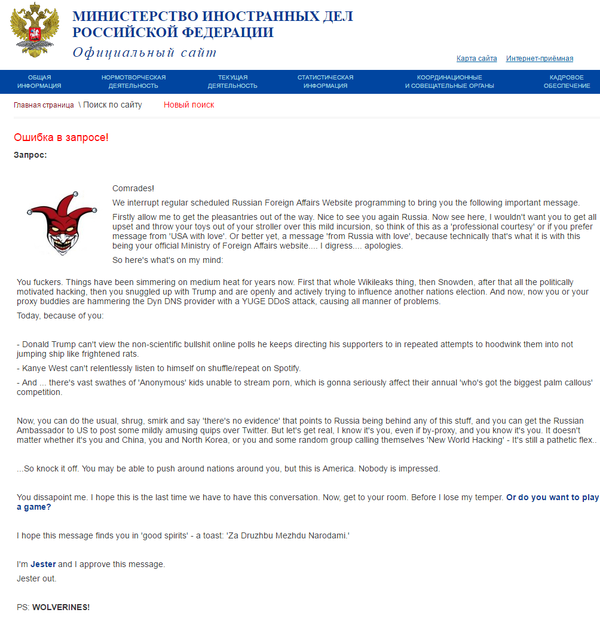"The website was hacked. Who did it – that's what the experts are trying to figure out. Attacks on the website have become more frequent since 2013," Zakharova said.
An internet hacker by the name of "Jester" posted online on Saturday, claiming to have hacked the Russian Ministry of Foreign Affairs website, apparently unaware it was the archived site. He posted a link to a message placed on the site by hacking its computer code.
#ICYMI MSG 'From Russia with Love' — I'm Jester & I approve this message via the Russian Foreign Affairs Website >> https://t.co/K0pwcChX8N
— JΞSTΞR ✪ ΔCTUAL³³º¹ (@th3j35t3r) 22 октября 2016 г.
"Comrades! We interrupt regular scheduled Russian Foreign Affairs Website programming to bring you the following important message," Jester wrote.

The hacker told the US television channel CNN that he'd decided to hack a Russian institution after Friday's cyber attack on Washington-based web technology provider Dyn, one of the country's biggest hosts of Domain Name Servers (DNS).
"I wanted to poke them in the eye and stop feeling like the US is just taking it on the chin. Again," Jester told CNN.
On Friday, hackers subjected Dyn's DNS infrastructure to a distributed denial of service (DDoS) attack, which overwhelmed the web service with traffic and disrupted the work of several websites, including PayPal and Twitter.
In a Facebook post, Zakharova explained that the hacker had only succeeded in hacking the older version of the Russian Foreign Ministry website, which has not been in use for over a year. The old website, along with the Ministry's current website, is working normally despite the hack.
"If it is established the hack was carried out by the Americans, even if it is a resource that is not in use, then that's not very good because it shows that either the cyber-machine of destruction talked about by Biden and Mcfaul has started operating, or this hellishly provocative electoral campaign in the US has got people into such a state that they begin to destroy everything in their path," Zakharova wrote.
The spokeswoman also referred to CNN's decision to publish its interview with "Jester" without seeking confirmation about a hack from the Ministry.
"Before publishing information about the hack of the Ministry of Foreign Affairs website by an American hacker, CNN did not approach the Ministry of Foreign Affairs for confirmation. Apparently, they (CNN) have some compelling evidence that this was a hack, and the American hacker carried it out. Well, of course CNN can't publish unverified information," Zakharova added with sarcasm.



